Mitsubishi Corporation (MC), which is involved in businesses across a wide range of products and services worldwide, believes that maintaining sustainable supply chains is fundamental to doing business globally. MC has formulated its Materiality as a set of crucial societal issues to address through its business activities, in order to continuously create MC Shared Value as set fourth in Midterm Corporate Strategy 2024. Since MC handles a wide range of products and services globally, respect for human rights, which falls under the material issues of "Promoting Stable, Sustainable Societies and Lifestyles" and "Respect for Human Rights in Our Business Operations," is a crucial issue for management to address.
MC has established the Mitsubishi Corporation Policy for Sustainable Supply Chain Management, which outlines MC’s actions to address human rights, labor rights and environmental issues in the supply chain. This policy serves to convey MC’s fundamental perspective to all of its suppliers.
Since its foundation, MC has adhered to the Three Corporate Principles which have guided its corporate philosophy and which place considerable emphasis on the importance of its corporate social responsibilities. Moreover, our Corporate Standards of Conduct outline our commitment to comply with all relevant laws and international regulations and to act responsibly with respect to the highest social standards. Our Corporate Standards of Conduct further elaborate on our commitment to preserving the global environment and pursuing sustainable development through all aspects of our business activities.
1. Policy
For MC, as a global company involved in businesses across a wide range of products and services, ensuring sustainable supply chains is a key issue. MC has established the Mitsubishi Corporation Policy for Sustainable Supply Chain Management, which outlines MC’s actions to address human rights, labor rights and environmental issues in the supply chain. This policy serves to convey MC’s fundamental perspective to all its suppliers.
2. Monitoring
MC conducts annual surveys of suppliers to monitor the status of their compliance with the Basic Policy and to strengthen communication with suppliers. Furthermore, MC visits suppliers to check the status of their activities when it determines that site visits are necessary based on region and business activities. Audit reviews are carried out based on the audit lists prepared with the advice of an outside advisor, and guidance is given to the suppliers.
3. Response to Compliance Violations
If a violation of the Basic Policy is confirmed, MC will demand that the relevant supplier implement corrective measures and will provide guidance and assistance to the supplier as necessary.
If MC determines that the supplier is unlikely to implement corrective measures even after providing continuous guidance and assistance, MC will re-evaluate its business relationship with the relevant supplier.
By sharing its Policy for Sustainable Supply Chain Management in its contracts with suppliers*The terms and conditions of purchasing contracts, consignment sales agreements, long-term purchasing contracts, etc.*, MC ensures its suppliers abide by the Basic Policy. MC may ask a supplier to correct their business behavior if there is a violation of the Basic Policy, and will re-evaluate its business relationship with the relevant supplier if no correction has been made. MC will continue to work with its suppliers to ensure that environmental and social considerations are taken into account.
MC has formulated individual guidelines for certain products.
The MC Group prioritizes maintaining comfortable living environments for livestock as well as aquaculture species and believes that the resulting reduction of stress and illness contributes to improved productivity as well as the production of safe livestock and marine products. We see animal welfare as vital to the establishment of sustainable supply chains and work closely with our suppliers to improve animal welfare, including the monitoring of related initiatives through our Sustainable Supply Chain Survey.
Our consolidated subsidiary Cermaq has established an animal welfare policy as well as a number of indicators to ascertain whether animal welfare is being upheld.
On October 2024, Cermaq was awarded by the NGO Compassion in World Farming with their Special Recognition Prize for Cermaq’s welfare practices for humane slaughter of its salmon. For more information, please visit the Fish health and welfare page on the Cermaq Global website.

As a corporation playing a major role in the marine products business, MC recognizes the crucial part that we play in conserving marine resources and ensuring a sustainable supply for future generations. To find out more about MC's stance on Bluefin Tuna and the specific measures we are implementing, please refer to our most recent policy below.
Mitsubishi Corporation's Bluefin Tuna Sustainable Sourcing Policy(Updated July 2021)MC’s supply chain management measures are overseen by the Corporate Functional Officer (CSEO). The Sustainability Department plans and drafts related policies and measures. Following deliberations by the Sustainability Committee, which convenes approximately twice a year, items are put forward or reported to the Executive Committee and the Board of Directors.
| Officer in Charge | Kenji Kobayashi (Senior Vice President, Corporate Functional Officer, CSEO) |
|---|---|
| Deliberative Body (A subcommittee under the Executive Committee, a management decisionmaking body) |
Sustainability Committee Important matters related to supply chain management deliberated by the Sustainability Committee are formally approved by the Executive Committee and put forward or reported to the Board of Directors based on prescribed standards. |
| Department in Charge | Sustainability Dept. |
With sustainable supply chain management in mind, MC has identified products with high environmental and social risk (“products to be monitored”) in FY2016 and FY2020, with advice from consultants and external advisors. MC conducts annual human rights and environmental due diligence on the supply chains (through the Sustainable Supply Chain Survey) of suppliers of these “products to be monitored” to assess their level of compliance with the Mitsubishi Corporation Policy for Sustainable Supply Chain Management.
In identifying the commodities to be surveyed, MC referred to various international supply chain management declarations and international norms such as the UN Guiding Principles on Business and Human Rights, and prioritized them in terms of the following regarding potential impact to stakeholders: 1. Severity (scale of risk, their scope, and how remediable they might be) and 2. Likelihood (situation in each country, industry, and region of procurement).
MC asks suppliers of these "products to be monitored" certain questions that take into account the specific issues and risks of the products handled by each supplier, with a focus on aspects including “existence of policies,” “compliance with laws and regulations,” “prevention of forced labor, child labor, and discrimination towards workers,” “respect of the rights of employees to organize,” “environmental protection,” and “information disclosure.”
In addition, we receive responses from suppliers subject to the human rights and environmental due diligence to ensure its effectiveness, and look to correct or improve any issues identified. MC employs a system to identify suppliers that may have issues or that require specific action based on the results of responses to the survey. Following this, MC considers and decides whether additional surveys or on-site inspections are necessary. Furthermore, in order to improve the convenience and accessibility of the survey for suppliers, MC has built a web-based system and conducts the surveys through this online system.
In April 2024, MC conducted its annual survey of 870 suppliers from around 50 countries and regions for FY2023 transactions, where we have taken steps to correct or improve any issues identified. MC also conducted interviews with management and employees of certain suppliers to gain an understanding of actual conditions and exchanged information to help improve those situations.
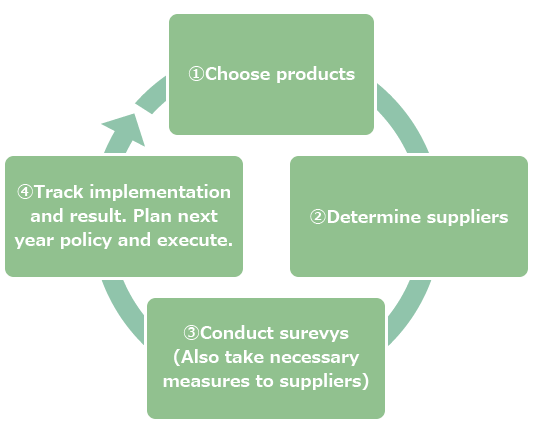
MC choose “products to be monitored” from all of its business products based on various international supply chain management declarations and international norms such as the UN Guiding Principles on Business and Human Rights and prioritizes them in terms of the following regarding potential impact to stakeholders: 1. Severity (scale of risk, their scope, and how remediable they might be) and 2. Likelihood (situation in each country, industry, and region of procurement). In addition, when significant environmental and social risks materialize through our business activities in the future, MC will consider investigating the target products without undergoing the above process.

The number of suppliers and the details of the survey are as follows. MC also conducted visits to certain suppliers to confirm the status of their activities. As a result of the survey, suppliers to be visited are selected from those where certain questions on the four issues (based on the ILO Core Labor Standards, etc.), are determined to have been answered insufficiently, or where best practices have been implemented.
Flowchart of the survey

Please check the link below for data on number of target suppliers.
The main of the countries of the target suppliers whose products and businesses are subject to the Sustainable Supply Chain Survey are as follows:

Please check the link below for data on number of survey Results.
For new suppliers, the Mitsubishi Corporation Policy for Sustainable Supply Chain Management is published and shared on our website. MC also ensures in our contracts with suppliers*The terms and conditions of purchasing contracts, consignment sales agreements, export consignment sales agreements, long-term purchasing contracts, etc.* that they comply with the Basic Policy. In cases such as when a supplier violates the Basic Policy, MC can request the supplier to take corrective measures, and if such measures are not taken, the contract can be terminated. In addition, MC conducts the Sustainable Supply Chain Survey in order to better understand the status of compliance with the Basic Policy.
Together with periodically receiving confirmation of support for the Mitsubishi Corporation Policy for Sustainable Supply Chain Management, MC conducts regular surveys of its suppliers to continuously monitor the status of their compliance with this policy. Furthermore, MC visits suppliers to confirm the status of their activities when necessary. MC continuously monitors existing suppliers to identify those that pose a high degree of environmental and social risk in line with this policy, for the purpose of verifying the appropriateness of current initiatives. Going forward, MC will incorporate the results of this reevaluation process into its supply chain management, with the goal of ensuring more effective supplier surveys.
In FY2023, MC visited Mabroc Teas Pvt Ltd. (Mabroc), a tea supplier based in Sri Lanka to observe on-site operations. Mabroc supplies tea to our group company, MC FOODS Ltd. During the visit, MC conducted on-site interview at tea farms operated by Mabroc’s group company to assess and confirm Mabroc’s sustainability management system.
MC has visited Mabroc in 2016. Back then, MC confirmed that Mabroc and its group company positioned societal and environmental initiatives at the core of their management value. During this year’s visit, MC confirmed that the initiatives have further deepened since then.
One of the symbolic measures is the appointment of female field managers. For about 200 years, due to historical and cultural reasons, tea leaves were hand-picked by female workers supervised by male field managers. However, Mabroc has started to appoint female field managers. During the visit, MC had an opportunity to interview a female field manager expressing how honored she is to be a field manager and how her family who has been engaged in the business of tea plucking for a long time is also happy about her appointment.
The company also provides field workers residential accommodations, medical facilities, as well as nursery school where workers can leave their children while they harvest. MC has confirmed that Mabroc conducts business by taking various initiatives to coexist with the workers who live and work in the plantation.
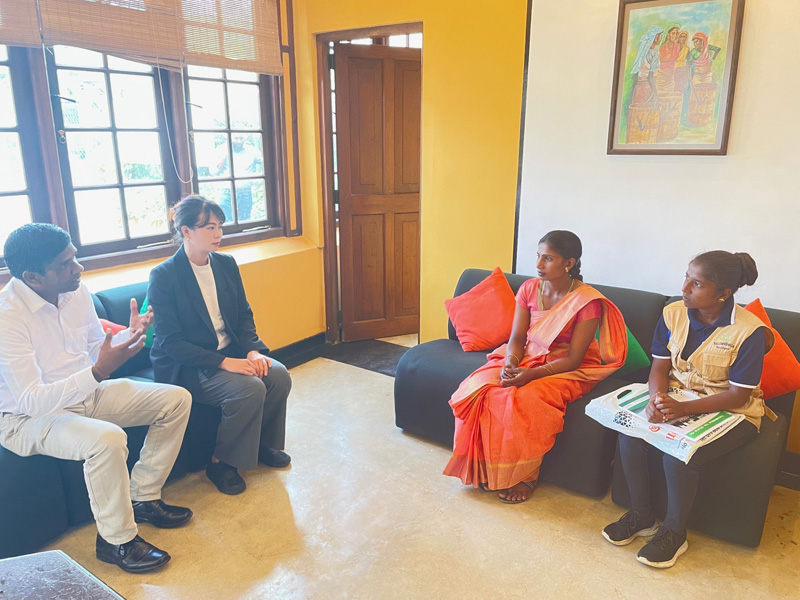
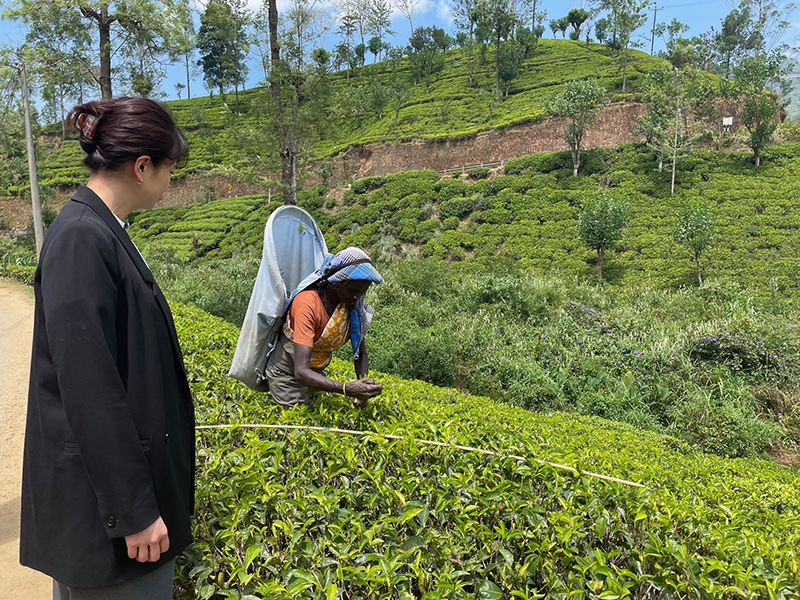
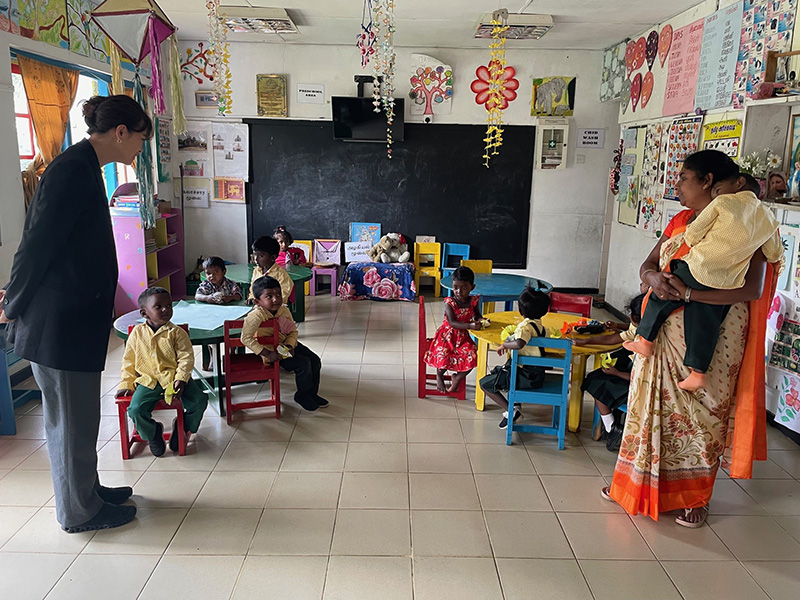
MC will continue to ensure sustainable operations throughout its supply chains in cooperation with MC Group companies and suppliers.
See past site visit reports hereIn the event that MC confirms, through additional surveys or on-site inspections, points that should be corrected or improved in relation to the Basic Policy, in addition to requesting the relevant supplier to take corrective measures, MC also provides guidance and assistance as necessary. If MC determines that a resolution is unlikely, even after providing continuous guidance and assistance, MC will review its business relationship with the relevant supplier.
In September 2023, MC held a “Business and Human Rights” seminar for global suppliers who are subject to the Sustainable Supply Chain Survey in order to strengthen communication and engagement with suppliers. Details are described below.
This webinar was held twice (once in English and once in Japanese) and was attended by a total of 150 participants from approximately 80 global suppliers.
During these webinars, an external lecturer was invited to explain the approach to human rights due diligence initiatives, taking into account the context of international trends, etc. Our company also explained the background behind the establishment of MC's Human Rights Policy, which was established in February 2024, and our company's efforts in this area. Our company’s business departments and suppliers also shared examples of good practice with the participants. Going forward, we will continue to strengthen our human rights and environmental due diligence practices on a consolidated basis.


After reviewing the results of human rights and environmental due diligence for the current fiscal year, MC discusses them with its internal and external stakeholders such as the Sustainability Advisory Committee, Group Chief Sustainability Officers, and Group Sustainability Managers in each Business Group. Based on these discussions, the Sustainability Committee will deliberate policy for the next fiscal year and put forward or report items to the Executive Committee and the Board of Directors.
In addition, MC considers reviewing its supply chain management policies as needed based on the status of dialogue with its stakeholders. Communication with suppliers about human rights and environmental due diligence in our supply chain has been an opportunity for suppliers to deepen their understanding of our sustainability approach, and MC will continue to actively and continuously work to improve its practices.
| Supply Management Policy that Caused MC to Review | Details |
|---|---|
| Human rights and environmental due diligence in the supply chain | By sharing Mitsubishi Corporation Policy for Sustainable Supply Chain Management in contracts with suppliers, MC ensures its suppliers abide by the Basic Policy |
The U.S. Financial Regulatory Reform Act (Dodd-Frank Act), enacted in July 2010, requires U.S. listed companies to disclose, based on reasonable investigations, whether conflict minerals*"Conflict Minerals" as defined by the law refer to tin, tantalum, tungsten, and gold.* used in their products are produced in the Democratic Republic of the Congo and/or neighboring countries where conflict-prone and reported inhumane acts are reported.
Although MC is not a U.S. listed company and is not directly subject to reporting and disclosure under the Act, MC has established policies and guidelines on the procurement of conflict minerals for our suppliers of tin, tantalum, tungsten, and gold to fulfill our social responsibilities in our corporate activities, and that the products supplied are not a source of funding for armed groups in the Democratic Republic of the Congo and/or its neighboring countries. MC also aims to take every measure not to be complicit in human rights violations and conflicts by armed groups.
Please check the link below for data on number of target suppliers.
In order to ensure the promotion of sustainability through our business, the General Manager of the Sustainability Department participates as a member of the Investment Committee, thereby ensuring a screening system that reflects potential environmental and social impacts in decision-making. In the screening of investment and loan proposals, MC screens based on not only economic aspects, but on ESG factors as well in our comprehensive deliberations and examinations. From the perspective of supply chain management, MC conducts due diligence and other screening on the status of human rights considerations not only subsidiaries and affiliates but also their business partners (supply chain), and utilizes the results of this for our deliberation and consideration.
Many employees at MC have the opportunity to undertake trading activities such as purchasing and sales, or to support such activities at some time in their careers. For this reason, MC strives to deepen the knowledge of all employees as buyers by explaining MC’s corporate philosophy, including respect for human rights in the supply chain. We also integrate the relevant supply chain policy into buyer training such as programs geared toward specific levels of management including those for new employees as well as training on trading practice.


MC is working to ensure sustainable supply chains by participating in various supply chain initiatives.
Sedex is a global platform that provides data-driven analysis, tools, and services designed to achieve continual improvements to a company’s ESG results. Other MC subsidiaries that have adopted Sedex include MC Agri Alliance Ltd., Asia Modified Starch Co., Ltd., and Nihon Shokuhin Kako Co., Ltd. These companies manages their supply chain using the Sedex platform in their business such as buying or selling raw materials for food, confectionary, beverages and other products. Thorough this Sedex platform, they are working with their business partners on issues such as respect for human rights and quality assurance across supply chains.
EcoVadis is a global cloud-based software as a service (SaaS) platform that offers comprehensive corporate social responsibility (CSR) evaluation tools. This platform has been adopted by multiple MC subsidiaries, including MC Agri Alliance Ltd. in 2021, and Mitsubishi Shoji Chemical Corporation in 2022. Both companies are using EcoVadis as a means of cooperating with their business partners on various supply chain issues, including respect for human rights and quality assurance.
The RTRS is a global initiative that provides certification services for responsible soybean production and distribution. As an RTRS-certified producer, MC subsidiary Agrex do Brasil LTDA sells soybeans grown on approximately 19,000 ha of farmland under conditions that meet the RTRS certification standards. Agrex do Brasil was the first company in Brazil to obtain RTRS certification for farmland in Brazil’s State of Maranhão. Obtaining RTRS certification is just one of many initiatives being pursued by Agrex do Brasil, which is also striving to make improvements in areas such as soil management and protection, water management, employee motivation, and the strengthening of relationships with local communities.
The ASC is an international non-profit organization that operates and manages certification and labeling system for responsible aquaculture products. In 2015, MC subsidiary Cermaq Group AS became the first salmon farming business in Canada to receive ASC certification for multiple sites.
The FSC is dedicated to the philosophy of forest management from the viewpoint of environmental protection, benefits to society, and economic sustainability. MC has obtained FSC chain of custody (CoC) certification for its timber processing and distribution operations. We ensure that any timber products handled by the MC Group have been produced with consideration for human rights, maintaining biodiversity and conserving natural capital.
Cermaq, an MC consolidated subsidiary, is committed to ensuring high standards related to the social and environmental impact of its business. Cermaq has established a Supplier Code of Conduct, taking into account the principles of MC’s Policy for Sustainable Supply Chain Management, to ensure responsible practices throughout the supply chain, and which describes the minimum standards that all Cermaq’s suppliers are expected to uphold. Cermaq expects its suppliers to request similar standards for their suppliers and subcontractors. In addition, Cermaq expects all its suppliers to comply with requirements in the areas of national legislation, human rights, labor rights, health and safety, anti-corruption, the environment, food quality and safety, management systems, and implementation. Regarding the environment, adverse impacts from the operations of the supplier on the community, the environment, and natural resources are expected to be minimized while safeguarding the health and safety of the public. Adverse impacts may include pollution, use of limited resources, deforestation, and the release of chemicals and other materials into the ground, sea or air and which pose a hazard if released into the environment. To minimize such risks, including reducing chemical use in fish farming, suppliers are expected to identify, monitor and control the environmental impact of their operations. Cermaq reports on compliance of its supply chain with fundamental human rights and decent working conditions.

Mitsubishi Corporation Packaging Ltd. (MP), an MC consolidated subsidiary, has established its own "Policy for Sustainable Supply Chain Management" which outlines MP’s actions to address human rights, labor rights, and environmental issues in the supply chain. This policy serves to convey MP’s fundamental perspective to all of its suppliers and subcontractors and the company requests that they understand, accept, and implement it.
MP also handles Forest Stewardship Council®‐ (FSC®)-certified products (cardboard, packaging paper, etc.) and confirms whether or not its paper manufacturing and processing suppliers have obtained this certification, which requires third-party audits, in order to ascertain the level of social and environmental risk.
MP has also obtained FSC Chain of Custody (CoC) certification and is adhering to its requirements to appropriately procure, store, and sell FSC-certified products.
Lawson, Inc., an MC affiliate comapany, provides freshly brewed coffee in Lawson convenience stores under the MACHI café brand. MACHI café’s coffee is made exclusively*1Excludes Single Origin Series and Decaffeinated Series.*1 from beans from Rainforest Alliance*2Established in 1987, Rainforest Alliance is an international non-profit organization devoted to environmental protection. The Rainforest Alliance Certification is granted only to farms that satisfy strict criteria, including criteria for environmental conservation and improving the livelihoods of farm workers.*2 Certified™ farms. Lawson also conducts activities to popularize and raise awareness such as participating in the Rainforest Alliance Consortium, which was set up through a collaboration between the Rainforest Alliance and companies that offer Rainforest Alliance Certified™ products. Lawson, as a member of this Consortium, runs promotional retweet campaigns.
Olam Group Limited (Olam), an MC affiliate company, is upholding its corporate philosophy of “Re-imagining Global Agriculture & Food Systems” to define its business growth as being achievable only through providing sufficient value to the environment and society. Olam strives for three outcomes: Improving Farmer Livelihoods, Increasing Community Wellbeing and Re-Generation of The Living World. Olam has selected 10 material areas for achieving these goals and is approaching them by building a framework to make an impact around 12 of the 17 Sustainable Development Goals (SDGs). In 2018, Olam launched AtSource, a digital platform that directly connects customers with suppliers to offer comprehensive sustainable solutions. This platform has grown to include 20 products and 300,000 small-holder farmers in 30 countries worldwide. With AtSource, more than 150 customers are able to access not only supplier profiles, but also a total of approximately 350 indicators, including environmental data such as amounts of CO2 emissions linked with purchased raw materials as well as social indicators such as farming yields. It also helps customers organize sustainability projects focused on specific areas. Moreover, Olam’s sustainability initiatives using the platform has led to the company receiving of the Reuters Responsible Business Award continuously from 2020 to 2023. In 2023, the Carbon Scenario Planner, a tool which shows above-mentioned efforts to visualize and reduce the abovementioned CO2 emissions, was also recognized with an Innovation Award by Food Ingredients Europe.
In addition, the company's sustainability initiatives have received high global acclaim, as shown by the fact that, Olam’s Co-Founder and Group CEO, Sunny Verghese has been Co-Chair of Champions 12.3 since 2021, a coalition of executives from the UN, governments, businesses, NGOs, etc., established to achieve SGD target 12.3, which calls for halving global food waste per capita by 2030.
In addition, AtSource was recognized by the Global Coffee Platform (one of the industry’s largest organizations, which sets the framework for sustainability in the coffee supply chain, and includes many companies from the countries of production and consumption) as one of the organization’s official standards.Olam has also received high praise from external organizations. For details of each initiative, please refer to the following company website.

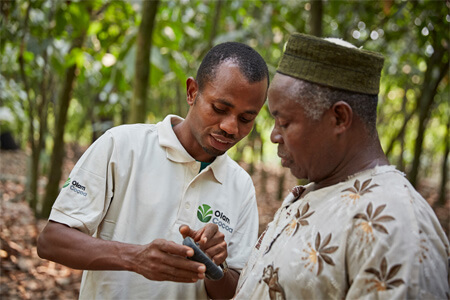
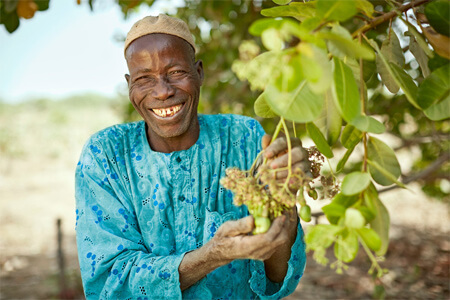
Please check the link below for data on Related data.

